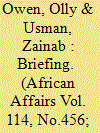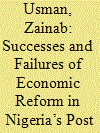| Srl | Item |
| 1 |
ID:
139637


|
|
|
|
|
| Summary/Abstract |
“A DO OR DIE AFFAIR” IS A COMMON DESCRIPTION of Nigerian elections, which underlines the competitiveness and acrimony that characterize the quadrennial political ritual. The recently concluded 2015 general elections were fiercer than most, with expectations that they would end in a contentious stalemate at best, and engulf the country in violent political crisis at worst. Many people stockpiled food, the affluent and many expatriate workers took strategically timed holidays abroad, and Nigerians in regions of the country distant from their birthplaces sent their families home in expectation of a prolonged post-election crisis. Yet, in the end, the actual conduct and outcome of the elections defied expectations. Not only did Nigeria conduct its most credible and transparent elections since independence with minimal violence but, for the first time in the country's history, an opposition party – the All Progressives Congress (APC) – defeated an entrenched ruling party (the Peoples' Democratic Party, PDP). The peaceful and credible conduct of these polls has set Nigeria on a trajectory towards consolidating its democracy, transitioning from a largely unstable and expedient experiment in 1999 to the realm of political maturity. This briefing discusses how this was achieved despite the challenging context.
|
|
|
|
|
|
|
|
|
|
|
|
|
|
|
|
| 2 |
ID:
175413


|
|
|
|
|
| Summary/Abstract |
There are limitations in the explanatory power of prevailing theories on the political economy of Africa’s growth without industrialization that emphasize the resource-curse, ethnicity, neopatrimonialism, and the developmental state. This article uses a political settlements approach to explain the institutional underpinnings of Nigeria’s economic transition. It shows how external constraints on ruling elites interact with the distribution of power and institutions to stimulate episodic reforms in an ‘intermediate’ Nigerian state. Rather than a ‘developmental’ state presiding over industrial upgrading or a ‘predatory’ state operating solely on neopatrimonial basis, this intermediate state presides over selective reforms and bursts of economic growth and diversification. Thus, specific constraints in Nigeria’s post-military political settlement from 1999 generated the initial impetus for successful telecoms liberalization, while inhibiting growth in the oil sector. This article contributes to advancing the political settlements framework in applying it to resource-rich countries, by outlining the four dimensions of the distribution of power and the constraints for institutional persistence or change, and their varying economic implications. It also reclaims the concept of ‘elite bargains’ as a defining feature of the horizontal distribution of power and demonstrates its centrality to the durability or fragility of institutions, especially at critical junctures of resource booms and busts.
|
|
|
|
|
|
|
|
|
|
|
|
|
|
|
|